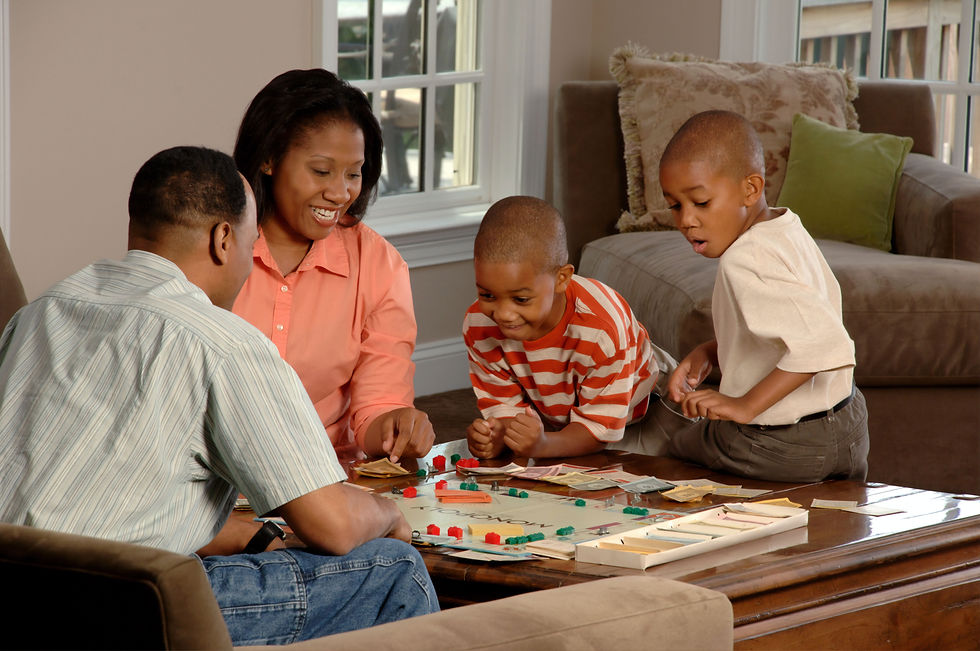How Family Roles Impact Our Love Lives
- drbrittanywoolford
- May 25, 2021
- 3 min read

Many of us are ready for the world to open back up, because we’re on the hunt for the golden egg - love. During the pandemic, we’ve done a lot of Netflix watching, snacking and board games, but we’ve also done some self-reflection, improvement and care. It’s important that, as we start to look seriously again for relationships, we recognize how the roles we’ve played in our pasts can show up in our romantic relationships.
For those of us already in committed relationships, these archetypes can also help provide insight to persistent conflicts that arise for you and your partner.
The Peacemaker
The peacemaker often sets aside his or her own needs in an effort to keep the equilibrium in the home. For children of parents who fought, or had a chaotic family life, the peacemaker probably checked in with their siblings frequently, swallowed their own needs, and were overly helpful to the adults in their life. In romantic relationships, the peacemaker might have a hard time expressing wants and needs for the sake of keeping their partners happy. Caring for others is a wonderful quality, but if their own needs aren’t met, resentment can build and the peacemaker’s ability to help can diminish.
The Golden Child
Often in narcissistic family systems, there are two key roles children play - the golden child or the scapegoat. For narcissistic families, children’s identities are not their own, but a direct reflection on the parents. The golden child functions as a source of pride - their successes and positive qualities are viewed as something owned or credited to the parent. The golden child is often given excessive words of affirmation and praise. As an adult, the golden child can have difficulty hearing criticism or feeling unloved or unwanted, because they were raised to believe that they are “perfect.” This is not to say the golden child is a narcissist themselves, or cannot have empathy. They often make great friends and partners, but must be aware of how they handle conflict and criticism.
The Scapegoat
The scapegoat, on the other hand, serves as the source of blame for the narcissistic parent. Where the golden child receives praise and exaltation, the scapegoat is the target of anger and resentment. They “can’t do anything right” or they “ruin everything.” As an adult, the scapegoat might have low self-esteem or be uncomfortable receiving compliments or praise, because it’s such a foreign concept for them. Partners of scapegoats have to figure out other ways to make their partners feel loved - quality time and physical touch can often help.
The Mascot/Clown
The family mascot/clown is “the funny one.” The family often doesn’t worry about him or her because they always appear to be joking or messing around. However, in moments where the mascot/clown has expressed emotional needs, they were likely dismissed because it was so out of character for them. Therefore, as an adult, the family mascot/clown masks painful emotions or needs with humor. As a partner, this person is super fun to be around - life is a comedy show. But they will struggle with avoidance and sweeping issues under the rug.
The Invisible Child
The invisible child is also often seen as “the easy kid.” They don’t cause trouble, they follow the rules, they’re well-behaved. At the same time, they usually fly under the radar when it comes to parental attention, because they’re not overly talented, impressively athletic or gifted academically. But this “good behavior” should not be overlooked as being a child who doesn’t need much. Often the invisible child desires connection but doesn’t know how to find it. Like the peacemaker, they may often stay silent when it comes to their emotional wants and needs as a romantic partner. But, if pressed, the invisible child can own these emotions - they’re just waiting to be asked.
See yourself in one of the descriptions above? Share your reaction in the comments!




Comments